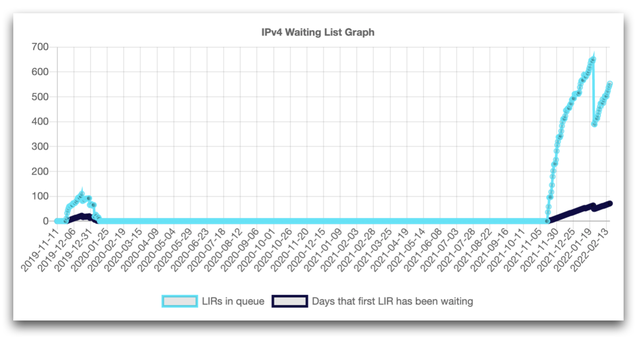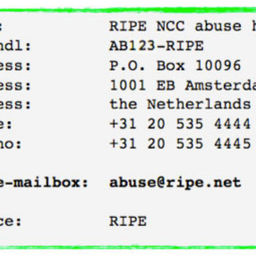Last December, an interesting discussion took place on whether current policies and procedures for the allocation and transfer of IPv4 resources in the RIPE NCC service region are in line with the original policy intent. To lend clarity on the issue, we take a closer look at policies and procedures that have come into place since we started distributing the last /8 we received from IANA.
A discussion that took place on the Address Policy Working Group last December pointed out the following issue. When the “last /8 policy” came into effect in September 2012, the community's intent was to provide newcomers with at least a small amount of IPv4 address space. However, the current waiting list for IPv4 allocations works on a first-come, first-served basis and contains a significant number of requests from members seeking address space for their multiple LIR accounts. As a result, newcomers can end up waiting a long time to receive their first IPv4 allocation.
A number of suggestions were made as to how the issue might be addressed by updating one or more of the following documents:
- IPv4 Address Allocation and Assignment Policies for the RIPE NCC Service Region (ripe-733)
- RIPE Resource Transfer Policies (ripe-682)
- RIPE NCC Charging Scheme 2022 (ripe-771)
The goal in this article is to show how these documents and their development over time relates to the issue at hand. First though, since there are actually two different kinds of document at play here, the contents of which are decided according to different processes, it will be useful to make the distinction between them clear.
RIPE Policies and RIPE NCC Procedures
All current and obsolete RIPE Documents are available through the RIPE Document Store. These include: reports or recommendations from RIPE Working Groups and Task Forces; RIPE policies; and RIPE NCC organisational documents covering RIPE NCC procedures. The first two documents listed above belong to the policy category, while the third is a procedure. The difference between the two is as follows:
- RIPE policies define how the RIPE NCC and its members are managing and registering their Internet Number resources (IPv4 addresses, IPv6 addresses and AS numbers). They are developed by the RIPE community through the bottom-up RIPE Policy Development Process (PDP).
- RIPE NCC business practices and procedures are put in place to ensure the application of RIPE Policies, they are governed by the RIPE NCC Executive Board and approved by the RIPE NCC membership.
IPv4 Allocations and Transfers, Multiple LIRs and the Waiting List
The current situation with IPv4 allocations can be outlined as follows:
A RIPE NCC member (a legal entity or a natural person) can open multiple Local Internet Registry (LIR) accounts and request a /24 IPv4 allocation for each of those accounts. IPv4 allocation requests are handled via a waiting list where priority is only determined by the chronological order in which requests are submitted.
It is possible to transfer IPv4 allocations received from the RIPE NCC or from a different holder via a previous transfer, merger, or acquisition. However, all transfers of IPv4 resources are subject to a 24 month holding period.
All members pay the same annual contribution (service fee) per LIR according to the RIPE NCC Charging Scheme. The RIPE NCC does not charge any additional fee for transfers.
Many of the concepts highlighted here have had a prominent role in the development of RIPE Policies and RIPE NCC procedures over the years. So let's take them one at a time.
IPv4 Waiting List (RIPE policy)
Currently the RIPE NCC uses the IPv4 waiting list, which operates on a first come first served basis, to allocate recovered IPv4 addresses to its members. This waiting list was implemented in November 2019 following an automatic policy update of the IPv4 address allocation and assignment policies for the RIPE NCC service region.

Since then, for a couple of years, the waiting time for LIRs to receive an IPv4 allocation has been reasonably short, as the RIPE NCC could distribute recovered IPv4 addresses that already went through the standard 6 months quarantine.
In November 2021, the waiting time for LIRs to receive a /24 IPv4 allocation increased significantly, and it may well increase further, as the amount of recovered IPv4 addresses that will become available in the future appears to be insufficient to satisfy all the incoming requests in a timely manner.
In the visualisation below, you can see in some detail how policy regarding the IPv4 waiting list developed over time:
Membership with Multiple LIRs (RIPE NCC Procedure)
It has almost always been possible for RIPE NCC members to open multiple LIR accounts. The option was suspended from 18 November 2015 until 25 May 2016 by a RIPE NCC Executive Board resolution following the RIPE NCC General Meeting held on 18 November 2015. At that meeting, RIPE NCC members raised concerns about a growing number of organisations opening additional accounts and subsequently obtaining multiple /22s from the last /8. This practice was perceived to conflict with the intention of the last /8 policy.
The members were asked on 11 February 2015 to provide feedback about whether opening LIR accounts should be prevented and, if so, what action should the RIPE NCC take. At the Board meeting on 31 March, the feedback from the members was discussed.
At the following General meeting, on 25 May 2016, the membership voted to reinstate the ability for members to open multiple LIR accounts on the grounds that, when this was not allowed, many new legal entities were created only to acquire an additional /22 IPv4 allocation and to be merged immediately after. This was making it difficult to establish who was holding the address space and providing multiple voting rights for the GM to the same member.
Transfers and Mergers (RIPE policy)
Currently, a member that received IPv4 space from the RIPE NCC or from another holder via policy transfer or merger/acquisition cannot transfer it before 24 months. The same hold time of 24 months applies also before a member holding multiple LIR accounts can transfer resources from one account to another of their accounts.
Most of the time, the member decides to close the LIR account without resources after the transfer, hence the RIPE NCC uses the term “consolidation” to refer to these cases.
The RIPE NCC Charging Scheme (RIPE NCC Procedure)
Since 2013, the RIPE NCC Charging Scheme model is based on the principle that all members pay the same annual contribution (service fee) per LIR and additional fees for IPv4 and IPv6 PI assignments; Anycast assignments; IPv4 and IPv6 IXP assignments; and Legacy IPv4 resource registrations through a sponsoring LIR. AS Numbers are excluded from this charge.
An additional one-time sign-up fee is due for new members as well as for additional LIR account registrations.
Every year, members can decide to vote at the General Meeting to return excess paid fees via a redistribution to the membership.
Last year the Executive Board presented the collected feedback from RIPE NCC membership about different possible options for the changing scheme mechanism and after further discussion and final deliberation, the current mechanism was kept in place maintaining the annual contribution of 1,400 Euros with a reduction of the one-time sign-up fee from 2,000 Euros to 1,000 Euros. This was done with the intention to make easier for small operators to become members.
It is in the hands of the RIPE community to decide how to promote and support the fair distribution of the last available IPv4 addresses to RIPE NCC members. Hopefully this article has provided some useful background information as to why the current policies for the allocation and transfer of IPv4 resources together with RIPE NCC Charging scheme have recently come under the spotlight.




Comments 2
The comments section is closed for articles published more than a year ago. If you'd like to inform us of any issues, please contact us.
Riccardo Gori •
Wonderful work Angela! Thank you
Angela Dall'Ara •
Grazie Riccardo :)